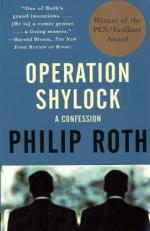|
This section contains 3,202 words (approx. 11 pages at 300 words per page) |

|
SOURCE: "The Spritzer," in The New Republic, Vol. 208, No. 14, April 5, 1993, pp. 31-4.
[Alter is an American educator and critic. In the following review, he examines Roth's use of farce and the doppelgänger in Operation Shylock.]
At least as far back as The Ghost Writer, which appeared in 1979, Philip Roth's fiction has exhibited an oddly correlated double development. The novels become more preoccupied with questions of Jewishness, the writer's relation to Israel, the Holocaust, anti-Semitism and the collectivity of Jews; and they become more self-reflexive, pondering the conundrums of their own fictionality or lack of it. These concerns were treated with the greatest imaginative richness in The Counterlife (1986), Roth's best book. His next novel, Deception (1990), was much thinner, cast entirely as a series of dialogues that record, among other things, a collision with genteel English anti-Semitism that impels the protagonist, as his mistress wryly notes, to "return to...
|
This section contains 3,202 words (approx. 11 pages at 300 words per page) |

|


